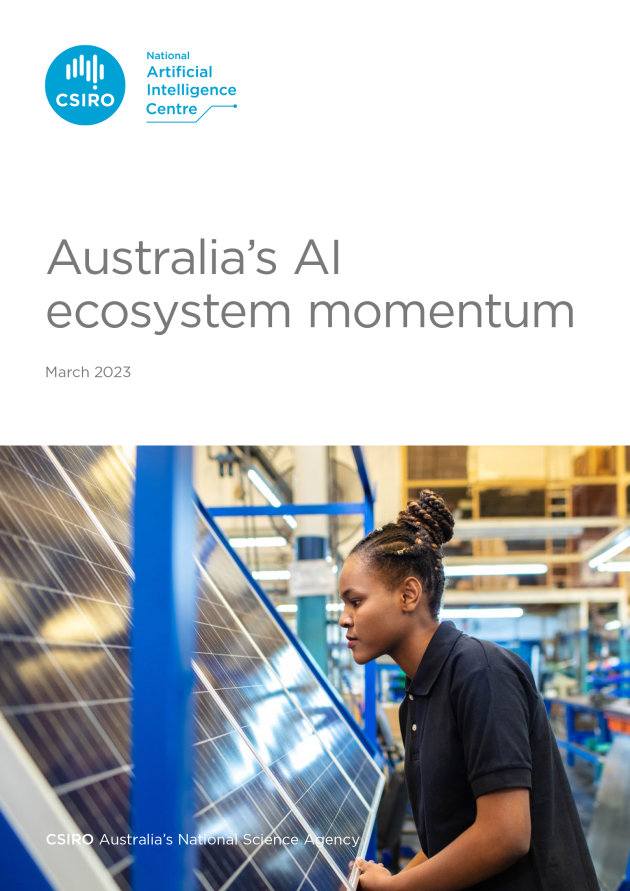The National AI Centre (NAIC) has released Australia’s AI Ecosystem Momentum report, incorporating feedback from more than 200 business decision-makers and AI service providers.
For the past decade, NAIC has observed AI adoption evolve from a futuristic promise pursued by early adopters with mature technology teams, to a legitimate and rapidly growing priority shared by many C-suite and senior leaders across functions. The resulting report, prepared by Forrester Consulting, describes a rapidly transforming AI ecosystem in Australia, where businesses are generating significant new revenue streams and efficiencies using AI technology; however, implementation remains complex.

Minister for science and industry Ed Husic launched the report, welcoming the centre’s work and observing the challenges Australian businesses have identified on their AI journey.
“AI is one of those enabling capabilities that’s poised to transform industries, and we know the economic potential is there, but seizing that business potential will take some work, building awareness and working across businesses, large and small, to make that a reality.
“Australia’s got some top AI talent here and we need to scale up this effort for the longer benefit of the nation. AI should be seen as more than just a business tool. We can put it to work to benefit communities and national wellbeing too,” said Husic.
The findings from NAIC note that AI implementation often requires multi-disciplinary teams, able to design end to end solutions that meet the needs of the context in which they’ll be used.
“This report is timely, suggesting a more nuanced direction for AI in Australia and emphasising the importance of collaboration and having access to the right talent for businesses,” said Husic.

NAIC director Stela Solar said AI was now far from a futuristic promise and has become a priority for Australian business leaders.
“Our research shows Australian businesses reported an average revenue growth of $361,315 for each AI-enabled solution that was implemented, regardless of which part of the business these efforts were targeted.
“Over 80 per cent of businesses surveyed expected their year-on-year revenue to grow, with technology at the centre of their growth strategies,” Solar said.
The report identified that delivery of AI projects is complex, reflecting a service provider ecosystem that was still fragmented and niche.
Most respondents reported engaging at least four AI technology and service providers to deliver an AI project, while 28 per cent of respondents reported working with more than six providers. Only 17 per cent reported working on projects with a single provider.
Solar said businesses needed to feel confident that they could access the right mix of skills if they were to take advantage of the opportunities offered by AI.
“As the AI landscape continues to evolve, we may move closer to having AI providers that can provide end-to-end solutions,” Solar said.
Australia’s AI Ecosystem Momentum Report findings:
- The top three benefits of implementing AI were improved security, greater revenue growth and increased cyber safety. Increased automation of internal processes and improved operational efficiency and effectiveness were also shown to be significant advantages of AI adoption;
- demand for AI products and services is high. Sixty per cent of respondents indicated they are accelerating and expanding their offerings to meet market demand;
- eighty per cent of businesses are expecting year-on-year growth, thanks to technology-focussed growth strategies;
- while many businesses surveyed are succeeding with AI adoption, the report found the delivery of AI projects in Australia is complex. Most respondents reported the need to engage at least four AI service providers to deliver an AI project. More than six providers were necessary for 28 per cent of respondents, while only 17 per cent worked with a single provider;
- privacy, security and data quality are challenges to AI adoption, exacerbated by talent shortages in Australia for implementing and operating AI systems;
- with demand for AI surging in Australia, the report calls on business leaders to develop and deploy responsible AI solutions in accordance with human and organisational values to ensure accountability and mitigate the risk of unintended consequences.
Read NAIC's AI Ecosystem Momentum report here.





